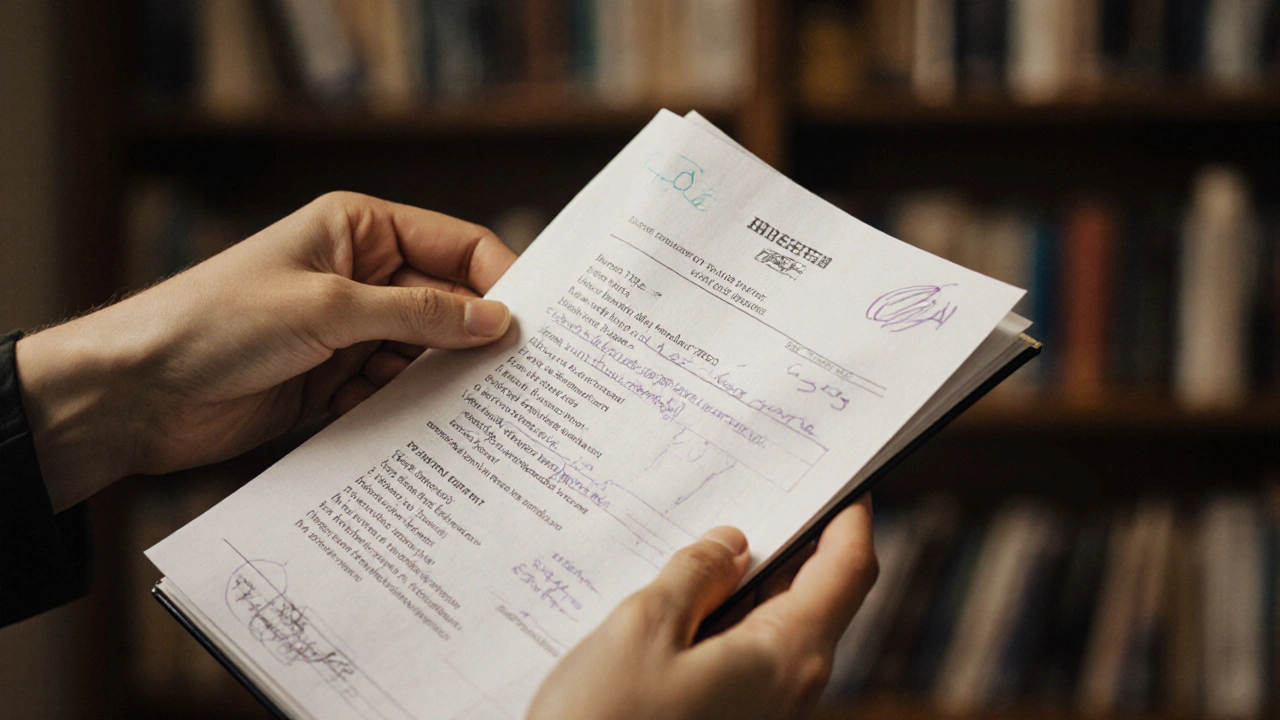When you’re applying to an MFA program, your portfolio is the star. But somewhere in the stack of materials, your transcripts sit quietly-waiting to be judged. You might be wondering: Does GPA matter for MFA? The short answer? It matters, but not like it does for med school or law school. Most MFA programs care more about your work than your grades. Still, a low GPA can hurt your chances-if it’s ignored entirely.
Why GPA Still Shows Up on MFA Applications
MFA programs are graduate degrees, so they follow some of the same rules as other grad schools. That means they ask for transcripts. But unlike MBA or PhD programs, MFA admissions aren’t driven by test scores or GPA cutoffs. There’s no universal minimum. A 2.8 GPA won’t automatically get you rejected. But if your GPA is below 2.5, you’ll need to explain why. Schools ask for transcripts because they want to see patterns. Did you struggle early on but improve dramatically? Did you take a break and come back stronger? Did you fail a class in calculus but ace every writing workshop? Admissions committees aren’t looking for perfect students-they’re looking for resilient artists who can handle feedback, deadlines, and the emotional grind of creating.What Happens When Your GPA Is Low
Let’s say your GPA is 2.6. You’ve got a killer writing sample. You’ve published in a few small lit mags. You’ve got strong letters of recommendation. You’re still a strong candidate. But your application might get flagged for a closer look. Here’s what happens next: an admissions reader will dig into your transcript. They’ll look for:- Did your grades drop in your final year? That could signal burnout or disengagement.
- Did you take a heavy course load and still earn B’s? That shows discipline.
- Did you retake classes and improve? That’s a red flag turned green.
- Are your low grades in unrelated subjects-like physics or accounting-while your creative writing grades were all A’s? That tells them your passion is real.
How to Turn a Low GPA Into a Strength
You can’t change your GPA. But you can reframe it. In your personal statement, don’t ignore it. Don’t make excuses. Don’t say, “I was partying too much.” Instead, say something like:“I didn’t take my undergrad seriously until I took my first creative writing class. Before that, I was just going through the motions. After that, I wrote every day. I started a zine with friends. I submitted to journals. I failed more times than I succeeded-but I kept going. My GPA doesn’t reflect the artist I became.”That’s the kind of story admissions committees remember. It shows growth. It shows grit. It shows you understand what this program is for. Some applicants even include a short addendum with their application-a one-paragraph note explaining a dip in grades due to illness, family issues, or mental health. If you do this, keep it brief. No drama. Just facts and what you learned.

What Schools Actually Say About GPA
Look at what top MFA programs state publicly:- University of Iowa Writers’ Workshop: “We do not have a minimum GPA requirement. We are primarily interested in your writing.”
- Columbia University: “While we review transcripts, GPA is not a decisive factor. Your writing sample and letters of recommendation carry far more weight.”
- NYU Creative Writing Program: “We’ve admitted students with GPAs as low as 2.2 when their writing was exceptional.”
- University of Michigan: “We expect applicants to have completed a bachelor’s degree. A low GPA may raise questions, but it does not disqualify you.”
What Matters More Than GPA
If GPA isn’t the gatekeeper, what is?- Your writing sample - This is non-negotiable. It needs to be polished, original, and show voice. One strong piece beats ten mediocre ones.
- Letters of recommendation - They should come from professors or professionals who’ve seen your work grow. A letter that says, “She turned a rough draft into something unforgettable,” means more than a glowing letter from a professor who barely knows you.
- Your personal statement - This isn’t a resume rewrite. It’s your chance to say why you need an MFA, not just why you want one.
- Relevant experience - Have you taught writing? Edited a journal? Published? Volunteered at a literary nonprofit? These show commitment beyond the classroom.

When GPA Really Becomes a Problem
There are times when GPA matters more:- If you’re applying for funding - Some fellowships and assistantships require a minimum GPA (often 3.0). If you’re relying on financial aid, you’ll need to check those rules.
- If you’re applying to a highly competitive program - Programs like Iowa, Stanford, or Brown get hundreds of applications. If two applicants have equally strong writing samples, the one with a 3.7 GPA might get the edge-not because GPA is fair, but because it’s an easy filter.
- If your transcript shows academic dishonesty - Plagiarism, cheating, or falsified grades will get you rejected, no matter how good your writing is.
What to Do Right Now
If you’re applying this year, here’s your action plan:- Get your transcript. Look at it honestly. Don’t panic. Don’t lie.
- Identify your strongest writing sample. Revise it until it’s the best thing you’ve ever written.
- Ask your recommenders if they can speak to your growth as a writer-not just your grades.
- If your GPA is under 2.5, write a short, honest addendum. No more than 150 words.
- Apply to programs that say they don’t have GPA cutoffs. Don’t waste money on ones that do if your GPA is too low.
Final Thought: Your Art Is the Only Thing That Counts
An MFA isn’t a reward for good grades. It’s an investment in your voice. The people who run these programs are writers themselves. They’ve read thousands of stories. They know the difference between someone who’s been trying to write for years and someone who just got a B in English 101. Your GPA is a footnote. Your writing is the headline.If your work is powerful enough, no one will remember your transcript. They’ll remember the story you told. And that’s the only thing that matters.
Is a 3.0 GPA required for MFA programs?
No, a 3.0 GPA is not required for most MFA programs. While some funding opportunities or specific schools may set a minimum, the majority of MFA programs prioritize your writing sample and creative potential over your GPA. Many admitted students have GPAs below 3.0, especially if their writing demonstrates strong skill and growth.
Can I get into an MFA with a 2.5 GPA?
Yes, you can. Many successful MFA applicants have GPAs around 2.5 or even lower. What matters is the strength of your writing sample, the clarity of your personal statement, and the support from your recommenders. Programs like Iowa, NYU, and Michigan have admitted students with GPAs in this range when their writing stood out.
Should I explain my low GPA in my application?
Only if there’s a clear reason-like a family emergency, health issue, or period of personal struggle-and you can show how you overcame it. Don’t make excuses. Instead, focus on your growth. A short, honest addendum (under 150 words) can turn a red flag into a sign of resilience.
Do MFA programs look at major-specific GPA?
Yes, they often do. If you got A’s in your creative writing courses but C’s in math or biology, admissions committees will notice. They care more about your performance in subjects related to your field. Strong grades in writing workshops carry more weight than your overall GPA.
Can I improve my chances if my GPA is low?
Absolutely. Focus on three things: perfect your writing sample, get strong letters from people who know your work, and write a compelling personal statement that shows your dedication. Publishing in literary journals, teaching writing, or attending workshops can also strengthen your application beyond GPA.


Comments
Gabby Love
My GPA was 2.7, and I got into Iowa. Didn’t mention it in my statement. Just sent the best story I’d ever written-revised 23 times. They didn’t care about my calc grade. They cared that I showed up every day to write, even when no one read it.
Jen Kay
Let’s be real-some of us had to work 30 hours a week while taking 18 credits just to stay afloat. My GPA doesn’t reflect my dedication. It reflects my bank account. And honestly? If a program rejects me because I didn’t have the luxury of dropping everything to write poems in a sunlit dorm, then maybe they’re not the right fit.
Michael Thomas
Stop coddling people. If you can’t keep your grades up, you can’t handle grad school. End of story.
Abert Canada
As a Canadian, I can tell you our programs don’t even look at GPA unless it’s below 2.0. They care about the voice in your writing. I had a 2.4, wrote a story about my grandfather’s silence after the war, and got into UBC. No addendum. Just the story. That’s all they needed.
Xavier Lévesque
My GPA was 2.1. I failed two writing classes. Then I wrote a novella in my basement while working night shifts at a 7-Eleven. Submitted it. Got in. They didn’t care about my transcript. They cared that I didn’t quit. That’s the whole damn point.
Thabo mangena
Allow me to respectfully assert that the academic record, while not determinative, remains a valuable indicator of sustained intellectual discipline. In many contexts, particularly those involving institutional funding, adherence to minimum benchmarks is not merely procedural-it is foundational. That said, the creative spirit, when unyielding, transcends even the most rigid metrics.
Karl Fisher
Ugh, another ‘my GPA was low but I’m special’ sob story. Newsflash: your zine doesn’t make you an artist. You’re not Hemingway. You’re just someone who failed organic chemistry and thinks that makes you ‘deep.’
Buddy Faith
They’re lying. GPA matters. They just don’t want to say it. If you’re not a white guy with a 3.5 and a dad who donated to the school, they’ll pretend they don’t care. But they do. They always do.
Sandi Johnson
My GPA was 2.8. I had a 4.0 in creative writing. My professor wrote in her letter: ‘She turned a failed poem into a Pulitzer contender in three drafts.’ That’s what got me in. Not the transcript. The rewrite.
Eva Monhaut
I had a 2.3. I worked as a janitor at a university library. I’d read every book on the shelf during my breaks. I wrote stories on napkins. I submitted them to every lit mag that would take them. I got rejected 47 times. On the 48th, I got in. My GPA? Irrelevant. My persistence? That was the portfolio.
mark nine
Just send your best work. Don’t overthink it. They’ve read 500 pieces. Yours better be the one that sticks.
Tony Smith
Let me clarify something with the utmost formality: the admissions committee’s evaluation framework is predicated upon a tripartite assessment-writing sample, recommendation fidelity, and personal narrative cohesion. GPA, while quantitatively present, is functionally ancillary unless it indicates systemic academic disengagement. One need not apologize for resilience.
Bill Castanier
My GPA was 2.6. My writing sample was a story about my mom’s Alzheimer’s. I didn’t write it to be sad. I wrote it because I had to. They accepted me. No explanation needed. Just the truth on the page.
Ronnie Kaye
Michael Thomas is a walking contradiction. He thinks GPA is everything, but he’s never submitted a single poem. Meanwhile, Gabby got into Iowa with a 2.7 and a story about a cat that talked in haiku. Who’s the real artist here?
Gabby Love
And that’s the thing. The people who scream the loudest about GPA? They never wrote anything worth reading. The ones who got in? They didn’t care what anyone thought. They just wrote.
Ian Maggs
Is the GPA not merely a statistical artifact of a system designed to quantify the unquantifiable? The soul of art resists measurement-yet we cling to grade-point averages as if they were sacred texts. Perhaps the true heresy lies not in a low GPA, but in our collective belief that it can ever capture the essence of a writer’s becoming.